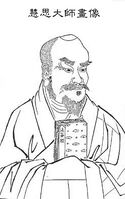Nanyue Huisi: Difference between revisions
(Created page with "{{Person |pagename=Nanyue Huisi |MainNamePhon=Nanyue Huisi |MainNameTib=南嶽懐譲 |PersonType=Classical Chinese Authors |bio=Nanyue Huisi. (J. Nangaku Eshi; K. Namak Hyesa...") |
No edit summary |
||
| (3 intermediate revisions by the same user not shown) | |||
| Line 1: | Line 1: | ||
{{Person | {{Person | ||
|MainNamePhon=Nanyue Huisi | |MainNamePhon=Nanyue Huisi | ||
|MainNameTib= | |SortName=Nanyue Huisi | ||
|MainNameTib=南嶽慧思 | |||
|PersonType=Classical Chinese Authors | |PersonType=Classical Chinese Authors | ||
|bio=Nanyue Huisi. (J. Nangaku Eshi; K. Namak Hyesa | |bio=Nanyue Huisi. (J. Nangaku Eshi; K. Namak Hyesa 南嶽慧思) (515-577). Chinese monk in the Tiantai school and teacher of Tiantai Zhiyi (538-597); also known as Great Master Nanyue and Great Master Si. Huisi was a native of Yuzhou in present-day Anhui province. According to his biography in the Liang-era Gaoseng zhuan, Huisi was obsessed with the prospect of death in his youth and assiduously pursued a means of attaining immortality. Studying with his teacher Huiwen (d.u.), about whom next to nothing is known, Huisi is said to have learned a meditative technique based on Nāgārjuna's premise of the identity of emptiness, provisionality, and their mean (see sandi), which he later taught to his own students. Monks who disagreed with his teachings tried to poison him, so Huisi left northern China for the south, but his popularity there prompted jealous monks to brand him a spy. This charge was rejected by the Chen-dynasty emperor, and Huisi continued to teach in the south, where he attracted many students, including the renowned Tiantai Zhiyi. Huisi's meditative teachings on the suiziyi sanmei ("cultivating samādhi wherever mind is directed," or "the samādhi of freely flowing thoughts") were recorded in Zhiyi's ''Mohe Zhiguan''. In this type of meditation, the adept is taught to use any and all experiences, whether mental or physical, whether wholesome or unwholesome, as grist for the mill of cultivating samādhi. Huisi is credited with the compilation of several treatises, such as the ''Dasheng zhiguan'', ''Cidi chanyao'', ''Fahua jing anle xingyi'', and others. (Source: "Nanyue Huisi." In ''The Princeton Dictionary of Buddhism'', 573. Princeton University Press, 2014. http://www.jstor.org/stable/j.ctt46n41q.27.) | ||
|images=File:Nanyue Huisi.jpg | |||
|yearbirth=515 | |yearbirth=515 | ||
|yeardeath=577 | |yeardeath=577 | ||
|bornin=Yuzhou in present-day Anhui province | |bornin=Yuzhou in present-day Anhui province | ||
|pagename=Nanyue Huisi | |||
}} | }} | ||
Latest revision as of 16:04, 20 July 2023
| PersonType | Category:Classical Chinese Authors |
|---|---|
| MainNamePhon | Nanyue Huisi |
| MainNameTib | 南嶽慧思 |
| SortName | Nanyue Huisi |
| bio | Nanyue Huisi. (J. Nangaku Eshi; K. Namak Hyesa 南嶽慧思) (515-577). Chinese monk in the Tiantai school and teacher of Tiantai Zhiyi (538-597); also known as Great Master Nanyue and Great Master Si. Huisi was a native of Yuzhou in present-day Anhui province. According to his biography in the Liang-era Gaoseng zhuan, Huisi was obsessed with the prospect of death in his youth and assiduously pursued a means of attaining immortality. Studying with his teacher Huiwen (d.u.), about whom next to nothing is known, Huisi is said to have learned a meditative technique based on Nāgārjuna's premise of the identity of emptiness, provisionality, and their mean (see sandi), which he later taught to his own students. Monks who disagreed with his teachings tried to poison him, so Huisi left northern China for the south, but his popularity there prompted jealous monks to brand him a spy. This charge was rejected by the Chen-dynasty emperor, and Huisi continued to teach in the south, where he attracted many students, including the renowned Tiantai Zhiyi. Huisi's meditative teachings on the suiziyi sanmei ("cultivating samādhi wherever mind is directed," or "the samādhi of freely flowing thoughts") were recorded in Zhiyi's Mohe Zhiguan. In this type of meditation, the adept is taught to use any and all experiences, whether mental or physical, whether wholesome or unwholesome, as grist for the mill of cultivating samādhi. Huisi is credited with the compilation of several treatises, such as the Dasheng zhiguan, Cidi chanyao, Fahua jing anle xingyi, and others. (Source: "Nanyue Huisi." In The Princeton Dictionary of Buddhism, 573. Princeton University Press, 2014. http://www.jstor.org/stable/j.ctt46n41q.27.) |
| YearBirth | 515 |
| YearDeath | 577 |
| BornIn | Yuzhou in present-day Anhui province |
| Other wikis |
If the page does not yet exist on the remote wiki, you can paste the tag |

